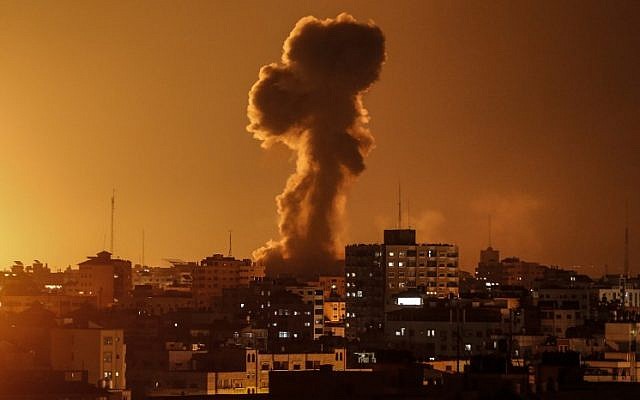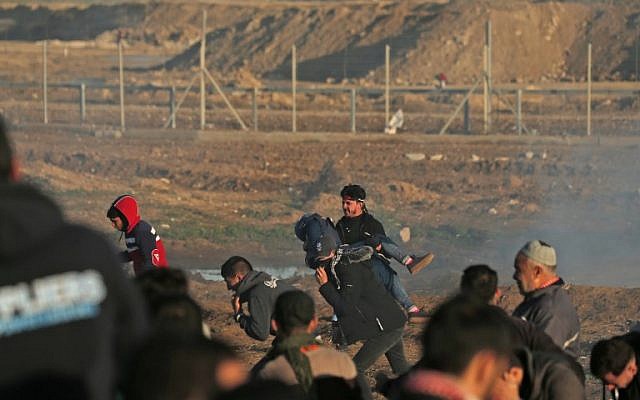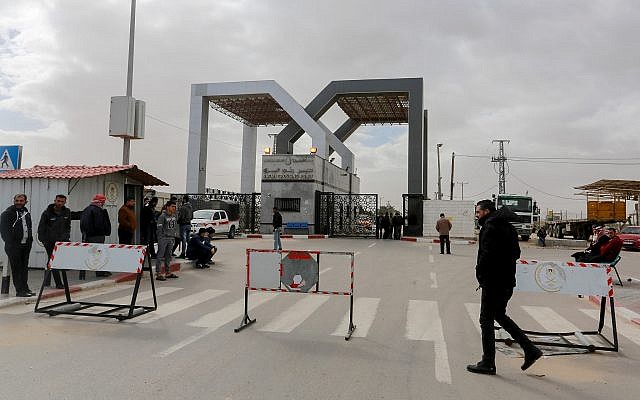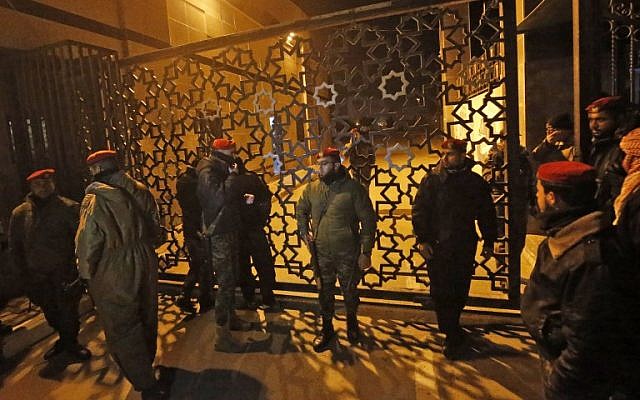Military says aircraft bomb two underground sites, after missile shot from enclave lands in open area in Israel

The Israeli military carried out airstrikes in northern Gaza on Saturday in response to an earlier rocket launch into Israeli territory, capping a weekend that saw deadly violence along the Gaza border.
“IDF fighter jets targeted two of Hamas’ underground structures in the Gaza Strip,” the Israel Defense Forces said in a statement.
“We will continue operating to defend Israeli civilians,” it added.
Two targets in Gaza City were hit by the Israeli strikes and no one was harmed, security sources in Gaza said.
Hamas is believed to have a large network of tunnels crisscrossing the Strip and close to, or under, the frontier with Israel.
The attack was in response to a rocket launch earlier in the night, the army said.
The military holds Hamas, which is the de facto ruler in Gaza, responsible for the any activity in the Strip.
The rocket landed in an open field in Israel, after setting off sirens in the southern communities of Sdot Negev and Sha’ar Hanegev, the IDF said. There were no immediate reports of damage or injuries.
Tamir Idan, head of the Sdot Negev Regional Council, called on the government to respond more harshly to rocket launches from the Hamas-ruled territory.
The rocket launch caps another weekend of violence along the Gaza border where some 13,000 Palestinians participated on Friday in the riots along the fence, throwing rocks, firebombs and hand-grenades at Israeli troops, burning tires and trying to breach the security fence. Israeli soldiers responded with tear gas and, in some cases, live fire, the army said.
A Palestinian woman was killed during the mass riot, the Strip’s Hamas-run health ministry said, as the Hamas terror group threatened renewed violence over fresh quarrels with Israel and the Palestinian Authority.
The Hamas-run Gaza health ministry identified the woman as Amal Tramsi, 43, saying she was the third woman to die in months of clashes.

The air force attacked two Hamas posts in northern Gaza in response to the violence, the Israel Defense Forces said Friday.
At least 15 other Palestinians were injured by Israeli fire during the border riots, the ministry said. One of them was reportedly a journalist, hurt when an ambulance was hit.
An Israeli soldier was lightly injured by a rock, the IDF said.
The Israeli army had braced for an outbreak of renewed violence along the Gaza border, as tensions escalated between Jerusalem and the Hamas terror group that rules the Strip as well as between the Palestinian Authority and Hamas.
The Egyptian military sent a senior delegation to the Palestinian enclave on Thursday, led by deputy chief of the Egyptian General Intelligence Services Ayman Badia, in an effort to negotiate a settlement on some of the issues and prevent an escalation.

The delegation left Gaza on Friday afternoon and traveled to Ramallah in the West Bank for talks with the PA.
Throughout the morning, Palestinians along the border launched balloons laden with incendiary devices across the border into Israel. As of Friday afternoon, they had caused no significant damage.
However, more serious clashes with Israeli troops began later in the day, following afternoon prayers, as has been the case since March 2018, with the start of the “March of Return” protests, an initially civilian-led movement that was quickly hijacked by Hamas. An Islamist terror group that seized control of Gaza in 2007, Hamas seeks to destroy Israel.
As it does every week, the Israel Defense Forces deployed troops along the border ahead of Friday’s riots. No special safety instructions were given to Israeli communities near the border.
In recent days, Hamas has ramped up its threats of renewed violence along the Gaza border after Israel halted the transfer of $15 million of Qatari funds to the terror group after an exchange of fire earlier this week. The funds are part of a series of six $15 million deposits Israel is allowing Qatar to deliver to Hamas as part of a highly contentious ceasefire agreement. The funds are meant ostensibly to pay the group’s civilian workers, though some Israeli officials — including former defense minister Avigdor Liberman — maintain the money will be used for Hamas’s terrorist activities.
Palestinian sources in Gaza this week reported that Hamas is planning to renew incendiary balloon attacks, along with the offensive tactics implemented in the weeks preceding the Qatari cash injection.
A week ago, Hamas officials met with the heads of the “kite unit,” as well as leaders of the group’s so-called “tire unit” and a unit that carries out a variety of operations close to the border under the cover of darkness, such as demonstrations and attempts to damage the fence.
At that meeting, the unit heads received a new budget to prepare for the next round of violence.
Adding to the tensions in Gaza, Hamas and the Palestinian Authority have stepped up their ongoing fight for power. This week the PA took the dramatic step of pulling its men from the Rafah Border Crossing with Egypt, effectively closing it, saying that Hamas had been intimidating and harassing their officials.

Hamas quickly sent its own men to reopen the crossing. However, Cairo refused to allow Palestinians to enter Egypt through the crossing. Gaza’s Hamas-run interior ministry said in a statement late Monday that Egyptian authorities had informed it that the crossing “will be limited to only the arrival of individuals and the entry of goods” into the Strip.
Badia’s delegation to Gaza on Thursday and Friday worked to resolve this issue between Hamas and the PA.
Khalil al-Hayya, deputy head of Hamas, told journalists on Thursday that the Egyptians “assured us that there will be no changes at the Rafah border, and it will stay open” despite the personnel change.
There was no official confirmation from Egypt, which hosted US Secretary of State Mike Pompeo on Thursday.
It was not immediately clear when the crossing would fully reopen.
The PA had taken control of the Rafah crossing in November 2017, as part of a deal for Egypt to reopen the border, which had been entirely shut since August of that year and largely sealed for years before that.
Israeli officials reportedly lobbied for Cairo to reopen the crossing, fearing keeping the crossing with Egypt closed could lead to a buildup of pressure in Gaza that would turn against the Jewish state. This would also serve as a significant blow to the PA, which would lose one of the few areas of control it still has in the Gaza Strip.
Senior Egyptian officials were quoted in a report Thursday in the Qatari al-Araby al-Jadid newspaper as saying that the Israeli defense establishment “is concerned that squeezing the Gaza Strip will turn the attention of the Palestinian factions toward” Israel.
Hayya said he expected that all sides would stick to an informal truce agreement with Israel.
As reported by The Times of Israel
